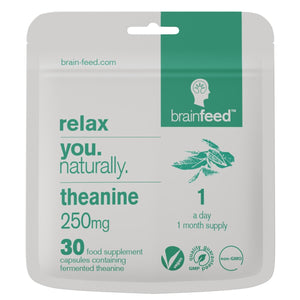Brain benefits of drinking matcha revealed: myth vs facts
filter
Matcha lattes have become a popular part of today’s culture due to their potential health benefits being promoted by Gwyneth Paltrow, Los Angeles’ “healthy eating” influencers and the self-proclaimed queen of matcha, Kourtney Kardashian. Extracted from green tea leaves, matcha is believed to promote relaxation while also keeping you alert and awake and is therefore a trendy choice in a lot of coffee shops. People do wonder - is matcha good for you? Read about the benefits of drinking matcha and discover how it actually works.
What’s your order - matcha vs coffee?
Matcha is a type of green tea that has been growing in popularity in recent years. It is made from the leaves of the Camellia sinensis plant, which are ground into a powder. Matcha is traditionally consumed in East Asia, particularly in Japan. Matcha is consumed differently from regular tea leaves or tea bags, as it is suspended in a liquid, typically water or milk. It’s also used to flavour and dye foods such as mochi, green tea ice cream and matcha lattes[1 Trusted Source Teatulia 3rd-party source What is Matcha? ] . Because matcha is produced from shade-grown tea bushes, the tea leaves tend to retain more of their caffeine which is a natural stimulant that can help improve alertness and concentration. How much caffeine in matcha is there? 1 cup of matcha contains between 25 to 70 mg of caffeine[1 Trusted Source Teatulia 3rd-party source What is Matcha? ] . The amount found in regular green tea varies from 24 to 40 mg, while coffee contains 85 to 200 mg[1 Trusted Source Teatulia 3rd-party source What is Matcha? ] . Caffeine is known to have several health benefits, including increased alertness, energy, and concentration[2 Trusted Source Johns Hopkins Medicine 3rd-party source 9 Reasons Why (the Right Amount of) Coffee Is Good for You ] . However, it is important to note that caffeine can also cause caffeine jitters and digestion issues.
Matcha for anxiety relief
Whilst studies are yet to emerge showing any evidence of matcha for anxiety relief, matcha does contain a well-studied nutrient known for its relaxation effects. Theanine is a compound found in the tea plant[3 Trusted Source 2020 - Plant Foods for Human Nutrition Systematic and meta-analysis The Effects of Green Tea Amino Acid L-Theanine Consumption on the Ability to Manage Stress and Anxiety Levels: a Systematic Review ] , [4 Trusted Source 2011 - Journal of the Science of Food and Agriculture Research evaluation L-Theanine: properties, synthesis and isolation from tea ] . Enough theanine helps you relax while still keeping you alert[5 Trusted Source 2011 - Journal of Functional Foods Human study Effects of l-theanine on attention and reaction time response ] , [6 Trusted Source 2017 - Canadian Journal of Physiology and Pharmacology Human study Caffeine and theanine exert opposite effects on attention under emotional arousal ] . Theanine increases the relaxation chemical GABA and brain waves linked to focus known as alpha waves[7 Trusted Source 2022 - Cleveland Clinic 3rd-party source Gamma-Aminobutyric Acid (GABA) ] , [8 Trusted Source 2019 - Psychology Today 3rd-party source 3 Amazing Benefits of GABA ] , [9 Trusted Source 2008 - Asia Pacific Journal of Clinical Nutrition Human study L-theanine, a natural constituent in tea, and its effect on mental state ] . According to a review on matcha’s relaxing effects, 1 gram of matcha on average contains 28.99mg of theanine[10 Trusted Source 2018 - Nutrients Animal study Stress-Reducing Function of Matcha Green Tea in Animal Experiments and Clinical Trials ] . Multiple studies have shown that a dose between 200mg and 400mg per day helps you feel more relaxed[3 Trusted Source 2020 - Plant Foods for Human Nutrition Systematic and meta-analysis The Effects of Green Tea Amino Acid L-Theanine Consumption on the Ability to Manage Stress and Anxiety Levels: a Systematic Review ] . 1 matcha latte contains about 2 grams of matcha. That means you would have to drink at least 6 matcha drinks to get enough theanine in matcha to reap the relaxation benefits of drinking matcha. Whilst 6 cups may sound like a matcha lover's dream, drinking this quantity can bring about side effects including insomnia and digestive issues. You can opt for a theanine supplement to boost relaxation instead. brain feed’s theanine is a natural fermented form and kept as pure as possible to ensure science-based results. Instead of having more than 8 cups of matcha per day, you can take 1 brain feed’s 250mg theanine capsule. New customers can use the code ‘NEW15’ at the checkout to get 15% off their first purchase.
The synergy between caffeine and matcha
Matcha is unique because it contains both caffeine and theanine, which work together to provide a balanced and sustained energy boost. When combined with caffeine, theanine may help promote a state of calm and focused energy, alleviating caffeine jitters[11 Trusted Source 2015 - Psychopharmacology Human study A double-blind, placebo-controlled study evaluating the effects of caffeine and L-theanine both alone and in combination on cerebral blood flow, cognition and mood ] , [12 Trusted Source 2013 - Nutritional Neuroscience: An International Journal on Nutrition, Diet and Nervous System Human study The combined effects of L-theanine and caffeine on cognitive performance and mood ] , [13 Trusted Source 2012 - Journal of Physiological Anthropology Human study Effects of L-theanine or caffeine intake on changes in blood pressure under physical and psychological stresses ] , [14 Trusted Source 2008 - Psychopharmacology Human study Time for tea: mood, blood pressure and cognitive performance effects of caffeine and theanine administered alone and together ] . A UK study on 48 healthy adults found that theanine helps lower the blood pressure that the caffeine has boosted[14 Trusted Source 2008 - Psychopharmacology Human study Time for tea: mood, blood pressure and cognitive performance effects of caffeine and theanine administered alone and together ] . It works as a caffeine buffer, meaning matcha is efficient in providing you with a healthy energy hit. You can read more about the synergetic effect between theanine and caffeine here.
Does your matcha smell? Opt for a high-quality one
Matcha is a delicate product that can easily oxidize when it comes in contact with oxygen. Oxidation is a process in which a substance combines with oxygen and forms another substance, for example, iron oxidising to rust. Oxidation of matcha powder can lead to a loss of flavour and nutritional value, as well as the formation of harmful compounds. To ensure the quality and safety of matcha, it is important to purchase it from a reputable source and store it in an airtight container in a cool, dry place. You can also look for matcha products that have been tested for oxidation levels, similar to how omega-3 supplements are tested for freshness. You can read more about that here.
How many matcha lattes should you have?
The optimal dose of matcha for health benefits is between 1-2 grams per day. Consuming too much matcha can lead to side effects, such as insomnia, anxiety, and digestive issues[1 Trusted Source Teatulia 3rd-party source What is Matcha? ] . Depending on how strong you make your matcha drinks, you should use 1 teaspoon of matcha powder per day. Try making a frothy, nourishing tea, using 1 teaspoon of matcha powder and mixing it in a 1/2 cup of hot water. You can also make a morning matcha latte. Here’s the recipe:
Sift 1 tablespoon of matcha powder into a mug. Add 1 tablespoon of hot water and whisk until no lumps remain. Stir in about 2 teaspoons of honey. Add 3/4 cup of hot milk (whichever you like best) and either whisk to combine or use a milk frother. Enjoy the homemade matcha latte!
Matcha is a type of green tea that contains caffeine and theanine, two compounds that work together to provide you with a balanced energy boost. Make sure to opt for high-quality matcha and only drink 1 matcha drink per day, despite how nice matcha lattes taste.
References
[1] What is Matcha? (n.d.). Teatulia. https://www.teatulia.com/tea-varieties-101/what-is-matcha.html
[2] 9 Reasons Why (the Right Amount of) Coffee Is Good for You. (n.d.). Johns Hopkins Medicine. https://www.hopkinsmedicine.org/health/wellness-and-prevention/9-reasons-why-the-right-amount-of-coffee-is-good-for-you
[3] Williams, J. L., Everett, J. M., D’Cunha, N. M., Sergi, D., Georgousopoulou, E. N., Keegan, R. J., McKune, A. J., Mellor, D. D., Anstice, N., & Naumovski, N. (2020). The Effects of Green Tea Amino Acid L-Theanine Consumption on the Ability to Manage Stress and Anxiety Levels: A Systematic Review. Plant Foods for Human Nutrition, 75(1), 12–23. https://link.springer.com/article/10.1007/s11130-019-00771-5
[4] Vuong, Q. V., Bowyer, M. C., & Roach, P. D. (2011). L-Theanine: Properties, synthesis and isolation from tea. Journal of the Science of Food and Agriculture, 91(11), 1931–1939. https://scijournals.onlinelibrary.wiley.com/doi/10.1002/jsfa.4373
[5] Higashiyama, A., Htay, H. H., Ozeki, M., Juneja, L. R., & Kapoor, M. P. (2011). Effects of l-theanine on attention and reaction time response. Journal of Functional Foods, 3(3), 171–178. https://www.sciencedirect.com/science/article/pii/S1756464611000351?via%3Dihub
[6]Giles, G. E., Mahoney, C. R., Brunyé, T. T., Taylor, H. A., & Kanarek, R. B. (2017). Caffeine and theanine exert opposite effects on attention under emotional arousal. Canadian Journal of Physiology and Pharmacology, 95(1), 93–100. https://cdnsciencepub.com/doi/10.1139/cjpp-2016-0498
[7] Gamma-Aminobutyric Acid (GABA) (2022). Cleveland Clinic. https://my.clevelandclinic.org/health/articles/22857-gamma-aminobutyric-acid-gaba#:~:text=It%20slows%20down%20your%20brain,with%20anxiety%2C%20stress%20and%20fear
[8] Breus, M. J. (2019). 3 Amazing Benefits of GABA. Psychology Today. https://www.psychologytoday.com/gb/blog/sleep-newzzz/201901/3-amazing-benefits-gaba
[9] Nobre, A. C., Rao, A., & Owen, G. N. (2008). L-theanine, a natural constituent in tea, and its effect on mental state. Asia Pacific Journal of Clinical Nutrition, 17(S1), 167–168. https://apjcn.nhri.org.tw/server/apjcn/17%20Suppl%201/167.pdf
[10] Unno, K., Furushima, D., Hamamoto, S., Iguchi, K., Yamada, H., Morita, A., Horie, H., & Nakamura, Y. (2018). Stress-Reducing Function of Matcha Green Tea in Animal Experiments and Clinical Trials. Nutrients, 10(10), 1468. https://www.mdpi.com/2072-6643/10/10/1468
[11] Dodd, F. L., Kennedy, D. O., Riby, L. M., & Haskell-Ramsay, C. F. (2015). A double-blind, placebo-controlled study evaluating the effects of caffeine and L-theanine both alone and in combination on cerebral blood flow, cognition and mood. Psychopharmacology, 232(14), 2563–2576. https://link.springer.com/article/10.1007/s00213-015-3895-0
[12] Owen, G. N., Parnell, H., Bruin, E. A. D., & Rycroft, J. A. (2013). The combined effects of L-theanine and caffeine on cognitive performance and mood. Nutritional Neuroscience: An International Journal on Nutrition, Diet and Nervous System, 11(4), 193–198. https://www.tandfonline.com/doi/abs/10.1179/147683008X301513
[13] Yoto, A., Motoki, M., Murao, S., & Yokogoshi, H. (2012). Effects of L-theanine or caffeine intake on changes in blood pressure under physical and psychological stresses. Journal of Physiological Anthropology, 31(1), 28. https://jphysiolanthropol.biomedcentral.com/articles/10.1186/1880-6805-31-28
[14] Rogers, P. J., Smith, J. E., Heatherley, S. V., & Pleydell-Pearce, C. W. (2008). Time for tea: Mood, blood pressure and cognitive performance effects of caffeine and theanine administered alone and together. Psychopharmacology, 195(4), 569–577. https://link.springer.com/article/10.1007/s00213-007-0938-1


 alertness
alertness
 cognition
cognition
 sleep
sleep
 wellbeing
wellbeing


Leave a comment
Open tab